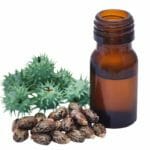Is canola oil good for hair?
At BeautyCaters, our expert team independently curates every recommended product. Purchases through our links may earn us a commission. Explore our transparent selection process.
Canola oil, a popular cooking oil, has gained traction as a potential hair care solution. But does it truly benefit your locks? Is canola oil good for hair? Let’s explore the pros and cons of using canola oil for hair and determine if it deserves a spot in your hair care routine.

What is canola oil?
Canola oil, derived from the rapeseed plant, has gained popularity as a versatile cooking oil. However, its benefits extend beyond the kitchen. Rich in essential fatty acids and vitamin E, canola oil has emerged as a potential hair care solution.
While not as widely discussed as coconut or argan oil, canola oil offers unique properties that could benefit your hair. Its lightweight texture and ability to penetrate the hair shaft make it a potential asset for various hair types. In the following sections, we’ll delve deeper into the potential benefits and drawbacks of using canola oil for hair care.
Composition and nutritional profile of canola oil
Canola oil, derived from the rapeseed plant, has undergone significant refinement to reduce its erucic acid content, making it a heart-healthy cooking oil. Its nutritional profile includes:
- Low saturated fat: Unlike some other oils, canola oil is low in saturated fat, making it a heart-healthy choice
- Essential fatty acids: Canola oil contains a balanced ratio of omega-3 and omega-6 fatty acids, both vital for maintaining healthy skin and hair.
- Vitamin E: This antioxidant protects cells from damage and supports hair growth.
Benefits of canola oil for hair
Fatty acids and vitamins-enriched Canola oil, offers numerous benefits for hair health. I broke down the 4 prime benefit that makes canola oil a game-changer in your hair care regimen:
- Deep hydration: Canola oil’s ability to penetrate the hair shaft effectively replenishes lost moisture, addressing dryness and restoring hair’s natural suppleness.
- Scalp nourishment: By providing essential nutrients and promoting a balanced scalp environment, canola oil can help alleviate common scalp concerns such as dryness, itchiness, and dandruff.
- Hair strengthening: The infusion of fatty acids and vitamins fortifies hair follicles, reducing breakage and promoting hair growth.
- Shine enhancement: Canola oil’s ability to smooth the hair cuticle imparts a lustrous shine, elevating the overall appearance of your hair.
Possible side effects of canola oil on hair
While canola oil presents numerous advantages, individual hair types and concerns may vary. It’s advisable to conduct a patch test before incorporating any new product into your hair care routine. Additionally, consistent use is key to experiencing the full benefits of canola oil. Incorporation it into your hair care regimen, you can potentially achieve softer, shinier, and healthier hair.
How to use canola oil for hair?

To effectively incorporate it into your hair care regimen, consider the following methods:
- Leave-in conditioner: Dilute canola oil with water and spritz onto damp hair as a lightweight leave-in conditioner.
- Pre-shampoo treatment: Apply a generous amount of warm canola oil to the scalp and hair, massaging gently for optimal penetration. Allow the oil to sit for at least 30 minutes, or ideally, overnight, for maximum benefits.
- Hair mask: Combine canola oil with other nourishing ingredients like honey or avocado for an intensive hair mask. Leave on for 30 minutes to an hour before rinsing thoroughly.
- Hot oil treatment: Gently warm canola oil and apply it to the scalp and hair. Cover with a shower cap for deeper penetration.
Nourishing hair masks with canola oil
Combining the benefits of coconut and canola oil creates a potent hair mask for deep conditioning and nourishment.
Coconut and Canola Oil Hair Mask
Ingredients:
- 1/2 cup coconut oil
- 1/2 cup canola oil
Method:
- Mix oils: Combine equal parts coconut and canola oil in a bowl.
- Warm oil: Gently warm the oil mixture for better absorption.
- Apply to hair: Massage the oil blend into your scalp and distribute evenly through your hair.
- Deep conditioning: Leave the mask on for at least 30 minutes, or ideally, overnight for maximum benefit.
- Rinse thoroughly: Shampoo and condition your hair as usual to remove the oil.
Canola and Almond Oil Hair Mask
Almond oil’s lightweight properties complement canola oil’s moisturizing benefits, making it suitable for various hair types. Enriched in vitamin E, it protects hair from damage, softens and moisturize hair and may help prevent premature graying and hair thinning
Ingredients:
- 1/2 cup canola oil
- 1/4 cup almond oil
Method:
- Mix: Combine equal parts almond oil and canola oil.
- Apply: Massage the mixture into your scalp and hair, focusing on dry or damaged areas.
- Soak: Leave the mask on for at least an hour, or ideally overnight for maximum benefits.
- Rinse: Thoroughly shampoo and condition your hair to remove the oil.
Note: For optimal results, perform these hair masks once or twice a week, depending on your hair’s needs.
Canola oil and hair type considerations
Understanding your hair’s porosity is crucial for maximizing the benefits of canola oil.
- Low porosity hair: Characterized by tightly sealed cuticles, low porosity hair benefits from lightweight oils like canola. It helps hydrate without weighing the hair down.
- High porosity hair: While canola oil can be used, it might not provide enough deep conditioning for severely dry and damaged hair. Consider combining it with thicker oils like coconut or olive for optimal results.
- Medium porosity hair: Canola oil is a versatile option for medium porosity hair, offering a balance of hydration and manageability.
Remember, these are general guidelines. Experimentation is key to determining the best approach for your hair’s unique needs.
Comparison of canola oil with other oils

When comparing canola oil to other oils commonly used for hair treatment, it is important to consider factors such as the oil’s composition, benefits, and drawbacks. Below is a comparison of canola oil with other popular oils.
| Canola Oil | Coconut Oil |
| Rich in omega-3 fatty acids | High in saturated fats |
| Light texture, easily absorbed by hair | Heavier texture, may weigh down fine hair |
| May help improve scalp health | Known for its moisturizing properties |
FAQs about canola oil
Does canola oil penetrate the hair shaft?
Yes, canola oil’s lightweight texture allows it to penetrate the hair shaft effectively, delivering moisture and nourishment.
Is coconut oil better than canola oil for hair?
Both coconut and canola oils offer benefits. Coconut oil is known for its deep penetration and protein protection, while canola oil provides lightweight hydration. The best choice depends on your hair type and specific needs.
Is canola oil good for low porosity hair?
Yes, canola oil is suitable for low porosity hair due to its lightweight nature. It can provide moisture without weighing down the hair.
Are canola oil and rapeseed oil the same?
Yes, canola oil is a refined form of rapeseed oil with lower levels of erucic acid, making it safe for consumption.
How can you tell if canola oil is pure?
Pure canola oil typically has a pale yellow color and a neutral taste. Avoid oils with an off-putting odor or cloudy appearance.
Final Word: Is canola oil good for hair?
Canola oil, often overlooked in the realm of hair care, offers a range of benefits for hair health. Its lightweight texture, coupled with essential nutrients, makes it a suitable option for many hair types. While it may not be a miracle cure for all hair woes, incorporating canola oil into your hair care routine can contribute to improved moisture, shine, and manageability.
Remember, consistency is key when using hair oils. Give canola oil a try and observe how your hair responds. For optimal results, consider combining it with other hair-friendly ingredients or consulting with a hair care professional to create a personalized hair care regimen.










